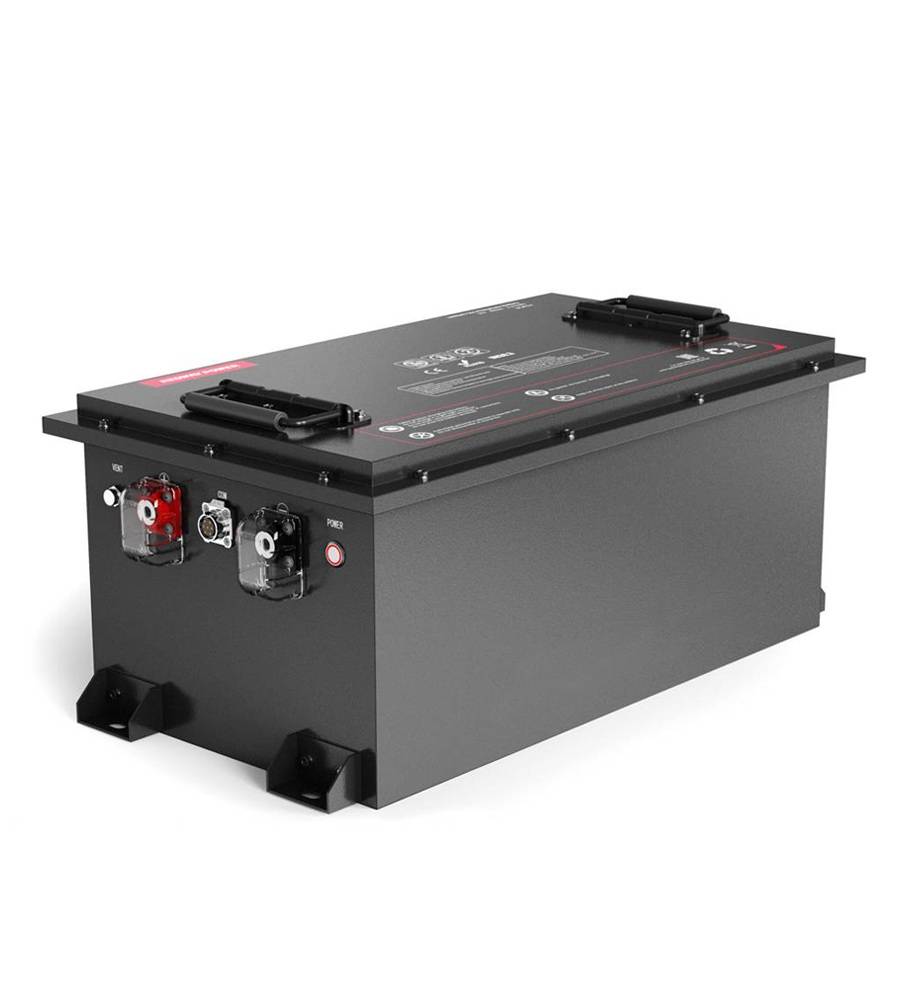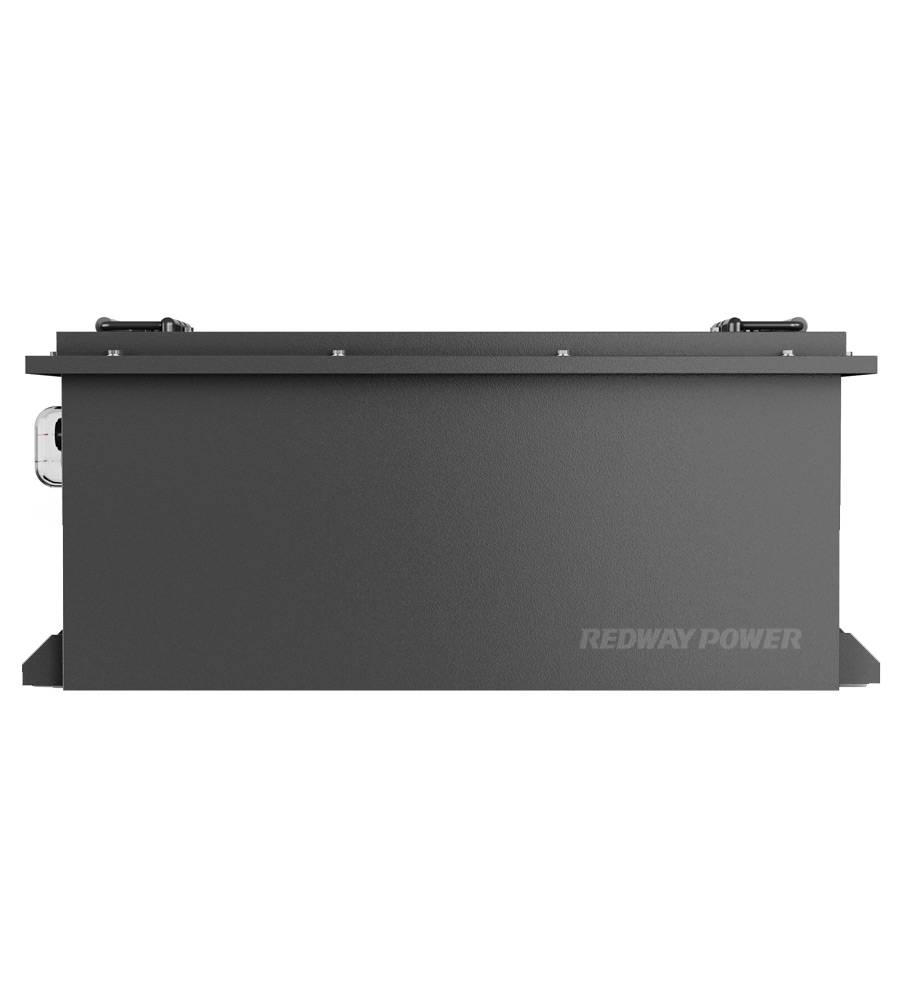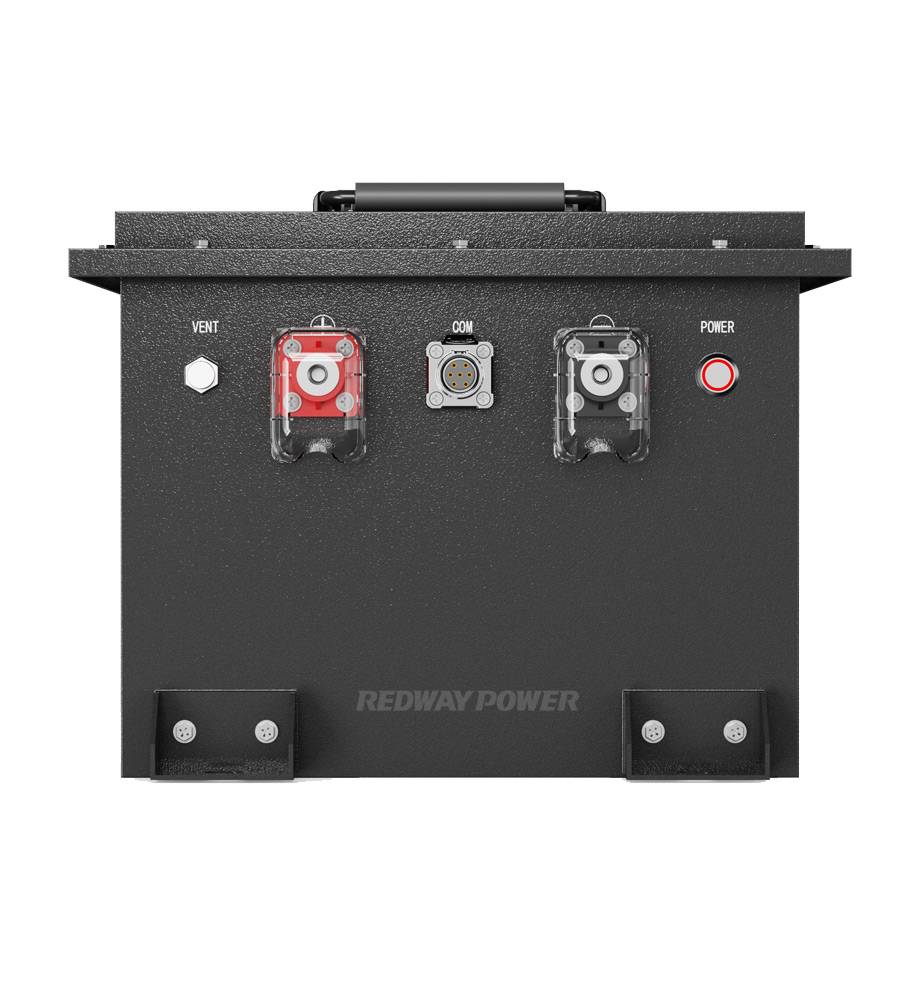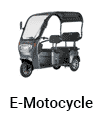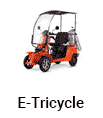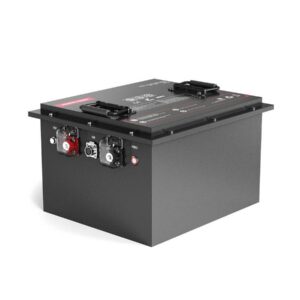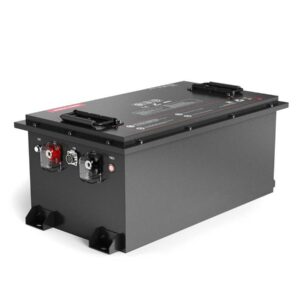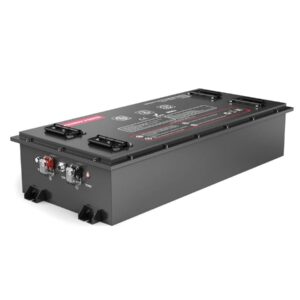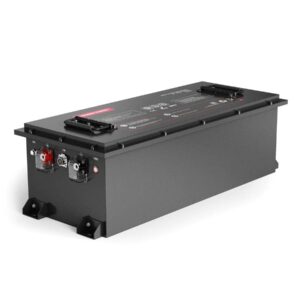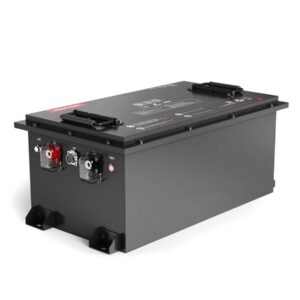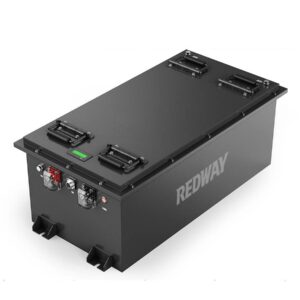Description
Introducing the 48V 100Ah LiFePO4 Golf Cart Battery (BMS 315A), a cutting-edge energy solution manufactured by a top OEM in China. This advanced lithium iron phosphate (LiFePO4) battery is specifically engineered for electric vehicles, including golf carts and utility vehicles. With its exceptional performance, longevity, and safety features, it is the ideal choice for wholesale buyers and B2B partnerships looking for reliable power solutions.
Key Features
- High Energy Capacity: This battery offers a nominal capacity of 100Ah and an energy output of 5120Wh, providing a driving range of approximately 70 to 90 km (43 to 56 miles) on a full charge, ensuring extended journeys without interruptions.
- Long Cycle Life: Designed for durability, it supports over 6000 cycles at 80% Depth of Discharge (DOD), significantly reducing long-term replacement costs compared to traditional lead-acid batteries.
- Advanced Battery Management System (BMS): The sophisticated BMS allows for a maximum continuous discharge current of 200A and protects against overcharging, overheating, and short circuits, enhancing safety throughout its lifecycle.
- Durable Construction: Rated at IP67, this battery provides superior protection against dust and water ingress, making it suitable for outdoor use in challenging environments.
- Customizable Options: Available with features such as Bluetooth monitoring, self-heating capabilities, and various communication protocols to meet specific client needs, making it an excellent choice for OEM and ODM projects.
Product Description
The 48V 100Ah LiFePO4 Golf Cart Battery is meticulously crafted to deliver reliable power for a diverse range of electric vehicles and equipment. Utilizing high-quality LiFePO4 cells ensures consistent energy output throughout its discharge cycle.
Key Specifications:
- Nominal Voltage: 51.2V
- Energy Output: 5120Wh
- Dimensions: Approximately 447mm x 283mm x 175mm (17.6 x 11.15 x 6.9 inches)
- Weight: Approximately 28 kg (61.7 lbs)
- Operating Temperature Range: Charging at 0°C to 60°C; Discharging at -20°C to 60°C
This battery operates effectively across a wide temperature range, making it ideal for both indoor and outdoor applications. The robust metal casing enhances durability while the advanced BMS continuously monitors critical parameters such as voltage, current, and temperature for optimal performance. With an impressive design life of up to 20 years and a warranty period of 5 years, this lithium battery is built for long-term reliability. The IP67 rating ensures that the battery is dust-tight and can withstand immersion in water, making it perfect for outdoor use.Investing in the 48V 100Ah LiFePO4 Golf Cart Battery (BMS 315A) guarantees a dependable power source while aligning with sustainability efforts through its eco-friendly design. Its extended lifespan reduces the frequency of replacements, ultimately lowering the total cost of ownership. Choose our 48V 100Ah LiFePO4 Golf Cart Battery for an efficient, powerful, and environmentally friendly energy solution tailored specifically for your electric vehicle needs. Contact us today to discover how we can customize our innovative battery technology to fit your specific requirements!
48V 100Ah LiFePO4 Battery Details
What are the key specs of 48V 100Ah LiFePO4 battery?
The 48V 100Ah LiFePO4 battery offers 5.12kWh capacity, supports up to 100A continuous discharge, and includes a built-in smart BMS. It provides over 3,000 cycles, high energy efficiency, and fast-charging capabilities. Its compact design, low weight, and long life make it ideal for golf carts and other electric mobility applications.
How long does 48V 100Ah LiFePO4 battery last?
This battery lasts 8-10 years, or 3,000-5,000 cycles, depending on usage and environment. Unlike lead-acid options, it maintains stable capacity over time, delivering consistent performance and a lower cost per cycle, especially with proper care and temperature management.
What is the charging time for 48V 100Ah LiFePO4?
Charging a 48V 100Ah LiFePO4 battery typically takes 4-6 hours using a 20A to 30A LiFePO4 charger. Thanks to low internal resistance, it can support fast charging without compromising battery health or lifespan.
What is the weight of 48V 100Ah LiFePO4 golf cart battery?
The battery weighs about 35-45 kg, significantly lighter than lead-acid counterparts. This lower weight enhances vehicle efficiency and range, while simplifying installation and improving overall handling.
Temperature range for 48V 100Ah LiFePO4 battery operation?
Operating temperature ranges from -20°C to 60°C, with charging recommended between 0°C and 45°C. This wide range ensures reliable use in diverse climates while maintaining battery safety and performance.
Warranty details for 48V 100Ah LiFePO4 golf cart battery?
Most 48V 100Ah LiFePO4 batteries include a 5 to 10-year warranty, covering manufacturing defects and performance degradation under normal use. Warranty length may vary by manufacturer, so review terms before purchase.
China OEM Lithium Golf Battery & 315A BMS
What is the capacity of China OEM lithium golf cart batteries?
China OEM lithium golf cart batteries typically range from 48V 50Ah to 48V 200Ah, with 100Ah being the standard. These batteries support high output, fast charging, and long cycle life, ideal for golf carts and utility vehicles.
How does 315A BMS enhance battery performance and safety?
A 315A BMS allows high current discharge while protecting against overcharging, overcurrent, and thermal overload. It ensures safe operation, balances cell voltages, and extends battery lifespan under heavy load conditions.
What certifications do China OEM lithium golf cart batteries have?
Most come with UN38.3, MSDS, CE, and RoHS certifications. These ensure batteries meet international safety, transport, and quality standards for global market compliance.
What are key design features of lithium golf cart batteries?
Key features include a compact, lightweight build, built-in BMS, high energy density, long cycle life, and quick charging capability. Many models are designed with waterproof cases and CAN/RS485 communication for smart integration.
How do lithium golf cart batteries compare to lead-acid?
Lithium batteries last 3-5x longer, are 70% lighter, and charge faster than lead-acid batteries. They are maintenance-free, with higher usable capacity and better performance under load, making them a smart long-term investment.
What maintenance ensures longevity of lithium golf cart batteries?
Minimal maintenance is needed. Keep terminals clean, avoid full discharge, and store in a cool, dry place. Use only LiFePO4-compatible chargers and periodically inspect voltage and BMS status.
LiFePO4 Golf Battery Benefits & Safety
What are the key features of 48V LiFePO4 golf cart batteries?
These batteries offer high capacity, fast charging, long lifespan, and built-in BMS safety. They are lightweight, maintenance-free, and deliver stable voltage, enhancing golf cart performance over time.
Why choose LiFePO4 chemistry for golf cart batteries?
LiFePO4 is known for its thermal stability, long cycle life, and non-toxic composition. It’s safer than other lithium chemistries and performs well in deep cycle applications, making it ideal for golf carts.
How do LiFePO4 batteries compare to lead-acid in golf carts?
LiFePO4 batteries last much longer, are lighter, and need no maintenance. They provide more usable energy, retain charge longer, and charge faster than traditional lead-acid batteries.
Are 48V LiFePO4 batteries suitable for electric vehicles?
Yes, they are used in golf carts, e-bikes, scooters, and other light EVs. Their deep cycle performance, safety, and high energy output make them ideal for electric transportation.
What maintenance do 48V LiFePO4 golf cart batteries require?
Little maintenance is required. Just avoid deep discharges, use a compatible charger, store in moderate temperatures, and check terminal cleanliness to ensure peak performance.
How safe are LiFePO4 batteries for golf cart applications?
Very safe. LiFePO4 chemistry resists thermal runaway, and integrated BMS prevents overvoltage, short circuit, and overcurrent. These features make them ideal for both daily and long-term use.
48V Lithium System for EVs
What are the key technical specifications?
A 48V lithium system typically includes a 100Ah LiFePO4 pack, a smart BMS, and up to 5kWh energy output. It supports CAN/RS485 communication, high discharge currents, and offers modular design for easy scaling.
How does it enhance EV performance efficiency?
The system offers light weight, fast charging, and stable power delivery. This results in improved range, acceleration, and energy efficiency, especially in urban EV and golf cart applications.
What safety standards does it comply with?
It meets UN38.3, CE, RoHS, and optionally UL1973. These standards ensure compliance with transport, environmental, and electrical safety regulations worldwide.
What is the lifespan and maintenance requirements?
Lifespan is 3,000-5,000 cycles, or up to 10 years. Maintenance is minimal: use the right charger, avoid full discharges, and store in moderate conditions to preserve performance.
How does it compare to traditional batteries?
Compared to lead-acid, it’s lighter, charges 3x faster, and lasts 5x longer. It also offers better safety, requires no water topping, and provides more usable energy per cycle.
Which EVs currently integrate 48V lithium systems?
48V lithium systems are widely used in golf carts, low-speed EVs, e-bikes, and AGVs. OEMs in China and abroad integrate them for their high efficiency and scalability.
Charging 315A BMS Lithium Batteries
How to safely charge a 315A BMS lithium golf cart battery?
Use a LiFePO4-specific charger with proper voltage settings (typically 58.4V for 48V systems). Ensure charger current does not exceed manufacturer recommendations. Avoid charging in extreme temperatures and monitor BMS indicators during the process.
What are optimal charging parameters for 315A BMS lithium batteries?
Optimal parameters include a voltage of 58.4V and a charging current of 20A to 50A. Always use a charger with BMS communication to balance cells and maintain safety.
Why is temperature monitoring critical during lithium battery charging?
Temperature monitoring prevents thermal runaway. If cells overheat, it can reduce battery life or cause damage. BMS systems cut off charging at unsafe temperatures, ensuring safe operation.
How does BMS protect lithium batteries during charging cycles?
BMS prevents overvoltage, overcurrent, and overheating. It balances cells during charging, stops input when full, and ensures battery longevity and safety at every cycle.
What are common errors when charging 315A BMS lithium batteries?
Errors include using an incorrect charger, charging at low temperatures, or exceeding the current limit. These issues can damage cells or shorten battery life. Always follow the manufacturer’s guide.
How to maintain 315A BMS lithium battery lifespan through charging?
Use the correct charger, avoid deep discharges, charge within the recommended temperature range, and store at 50% if unused for long periods. Monitor cell balance through the BMS app or display.
LiFePO4 vs Lead-Acid Battery Comparison
What is LiFePO4 vs Lead Acid battery lifespan?
LiFePO4 batteries last 3,000-5,000 cycles, while lead-acid averages 300-500 cycles. In years, that’s 8-10 years vs 2-3 years. LiFePO4 maintains capacity longer and supports deep cycling without damage.
Cost comparison: LiFePO4 vs Lead Acid for golf carts?
LiFePO4 has a higher upfront cost but lower total cost of ownership due to longer life and fewer replacements. Over time, it’s more cost-efficient, especially for frequent or commercial use.
Weight differences between LiFePO4 and Lead Acid batteries?
LiFePO4 batteries are up to 70% lighter. A 48V 100Ah LiFePO4 weighs around 40kg, compared to over 70kg for lead-acid. The lighter weight improves vehicle efficiency and handling.
Maintenance requirements: LiFePO4 vs Lead Acid batteries?
LiFePO4 is maintenance-free. Lead-acid needs water refills, corrosion checks, and equalization. Lithium requires only voltage checks and proper charging, saving time and labor.
Environmental impact of LiFePO4 vs Lead Acid batteries?
LiFePO4 is non-toxic, recyclable, and safer for the environment. Lead-acid batteries contain hazardous materials and need proper disposal to avoid pollution and contamination.
Charging efficiency: LiFePO4 vs Lead Acid golf cart batteries?
LiFePO4 offers 95-98% efficiency, while lead-acid is around 70-80%. This means faster charging, less energy loss, and lower electricity bills when using LiFePO4.

